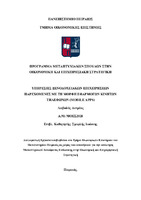Υπηρεσιες ξενοδοχειακών επιχειρήσεων παρεχόμενες με τη μορφή εφαρμογών κινητών τηλέφωνων (mobile apps)
Hotel business services provided in the form of mobile applications (mobile apps)

Master Thesis
Συγγραφέας
Λειβαδάς, Αντρέας
Leivadas, Antreas
Ημερομηνία
2023Επιβλέπων
Σμυρλής, ΙωάννηςSmirlis, Ioannis
Προβολή/
Λέξεις κλειδιά
Mobile applications ; Hotel business ; Guest experience ; Market size ; AdvantagesΠερίληψη
Η παρούσα διπλωματική εργασία με τίτλο "Υπηρεσίες ξενοδοχειακών επιχειρήσεων παρεχόμενες με τη μορφή εφαρμογών κινητών (Mobile Apps)" αποσκοπεί στη διερεύνηση της χρήσης των κινητών εφαρμογών στον ξενοδοχειακό κλάδο. Η μελέτη αρχίζει με τον ορισμό των κινητών εφαρμογών και την επισήμανση των διαφορών τους από τις διαδικτυακές εφαρμογές. Συζητά τα χαρακτηριστικά, τα πλεονεκτήματα και τους περιορισμούς των εφαρμογών για κινητά σε σύγκριση με τους ιστότοπους, συμπεριλαμβανομένων παραγόντων όπως η αμεσότητα, η συμβατότητα, η δυνατότητα αναβάθμισης, η δυνατότητα εύρεσης, η εμβέλεια και το κόστος. Η διατριβή εξετάζει επίσης τις διαφορές στην εμφάνιση μεταξύ του περιεχομένου των ιστότοπων και των εφαρμογών για κινητά, εστιάζοντας στο μέγεθος της οθόνης, τη διάταξη, την πλοήγηση, το μέγεθος της γραμματοσειράς, τις εικόνες, τα γραφικά και τη διαδραστικότητα. Το δεύτερο κεφάλαιο επικεντρώνεται στη χρήση των εφαρμογών για κινητά στον τουριστικό κλάδο, διερευνώντας διάφορους τομείς εφαρμογής, το μέγεθος της αγοράς και στατιστικά στοιχεία χρήσης παγκοσμίως, στην Ευρωπαϊκή Ένωση και συγκεκριμένα στην Ελλάδα. Επισημαίνεται η σημασία των εφαρμογών για κινητά στον προγραμματισμό ταξιδιών, την πλοήγηση, τις τουριστικές πληροφορίες, τα τρόφιμα, τις μεταφορές, τη μετάφραση γλωσσών και την εικονική και επαυξημένη πραγματικότητα. Το κεφάλαιο παρουσιάζει επίσης τις προβλέψεις για το μέγεθος της αγοράς και τα στατιστικά στοιχεία χρήσης, υποδεικνύοντας την αυξανόμενη δημοτικότητα και ζήτηση για κινητές εφαρμογές στον τομέα του τουρισμού. Το Κεφάλαιο 3 εμβαθύνει στη συγκεκριμένη χρήση των κινητών εφαρμογών στις ξενοδοχειακές επιχειρήσεις, αναλύοντας τα χαρακτηριστικά, τις δυνατότητες και τις καλές πρακτικές τους από την Ελλάδα και το εξωτερικό. Δίνει έμφαση στην έννοια της συνδημιουργίας πελατών και στο ρόλο των κινητών εφαρμογών στη διευκόλυνση της αλληλεπίδρασης επιχειρήσεων-πελατών. Διερευνώνται οι δυνατότητες των ξενοδοχειακών κινητών εφαρμογών, όπως η ευκολότερη εμπειρία κράτησης και check-in, η απομνημόνευση λεπτομερών δεδομένων, η παροχή αίσθησης ασφάλειας, η αποφυγή γλωσσικών εμποδίων και η προσφορά πληροφοριών και υπηρεσιών. Το κεφάλαιο εξετάζει επίσης την ενσωμάτωση της τεχνολογίας εικονικής πραγματικότητας (VR) στις ξενοδοχειακές εφαρμογές για τη βελτίωση της εμπειρίας του χρήστη και παρουσιάζει παραδείγματα ξενοδοχείων που χρησιμοποιούν την τεχνολογία VR. Ακόμη, η διατριβή εξετάζει τα μειονεκτήματα των εφαρμογών για κινητά, όπως το κόστος ανάπτυξης, η συνεχής συντήρηση, οι απαιτήσεις έγκρισης και η συμμετοχή των χρηστών. Συζητά τις ανησυχίες που σχετίζονται με την ασφάλεια, την αξιοπιστία, τη νομιμότητα και την ικανοποίηση των πελατών στον τομέα του τουρισμού. Παρουσιάζονται περιπτώσεις ξενοδοχειακών εφαρμογών στην Ελλάδα και το εξωτερικό, τα οποία αναδεικνύουν τα προηγμένα χαρακτηριστικά και τις λειτουργίες των εφαρμογών για κινητά από καθιερωμένες ξενοδοχειακές αλυσίδες. Η παρούσα διατριβή παρέχει μια εις βάθος ανάλυση της χρήσης των εφαρμογών κινητών τηλεφώνων στις ξενοδοχειακές επιχειρήσεις, διερευνώντας τα χαρακτηριστικά, τα πλεονεκτήματα και τους περιορισμούς τους. Εξετάζει τους τομείς εφαρμογής στην τουριστική βιομηχανία, το μέγεθος της αγοράς και τα στατιστικά στοιχεία χρήσης παγκοσμίως, στην Ευρωπαϊκή Ένωση και συγκεκριμένα στην Ελλάδα. Συνολικά η μελέτη παρουσιάζει καλές πρακτικές τόσο από την Ελλάδα όσο και από το εξωτερικό, αναδεικνύοντας τις δυνατότητες και τα οφέλη των κινητών εφαρμογών για τα ξενοδοχεία. Επιπλέον, η διατριβή ασχολείται με τα μειονεκτήματα των κινητών εφαρμογών και παρουσιάζει μελέτες περιπτώσεων ξενοδοχειακών εφαρμογών στην Ελλάδα και στο εξωτερικό. Τα ευρήματα της έρευνας υπογραμμίζουν την αυξανόμενη σημασία των κινητών εφαρμογών στον ξενοδοχειακό κλάδο. Οι κινητές εφαρμογές προσφέρουν σημαντικά πλεονεκτήματα, όπως η βελτιωμένη επικοινωνία, η βελτιωμένη εμπειρία των επισκεπτών και η αύξηση των εσόδων. Οι προβλέψεις για το μέγεθος της αγοράς και τα στατιστικά στοιχεία χρήσης δείχνουν μια αυξανόμενη ζήτηση για εφαρμογές κινητών τηλεφώνων στον τομέα του τουρισμού. Οι μελέτες περιπτώσεων καταδεικνύουν επιτυχημένες εφαρμογές κινητών εφαρμογών στην Ελλάδα και στο εξωτερικό, αναδεικνύοντας τον θετικό αντίκτυπό τους στην ικανοποίηση των επισκεπτών και στη συνολική λειτουργία των ξενοδοχείων. Με την υιοθέτηση των εφαρμογών κινητής τηλεφωνίας, τα ξενοδοχεία μπορούν να παραμείνουν μπροστά σε έναν ταχέως εξελισσόμενο κλάδο και να ανταποκριθούν στις αυξανόμενες προσδοκίες των τεχνολογικά ενημερωμένων ταξιδιωτών.


